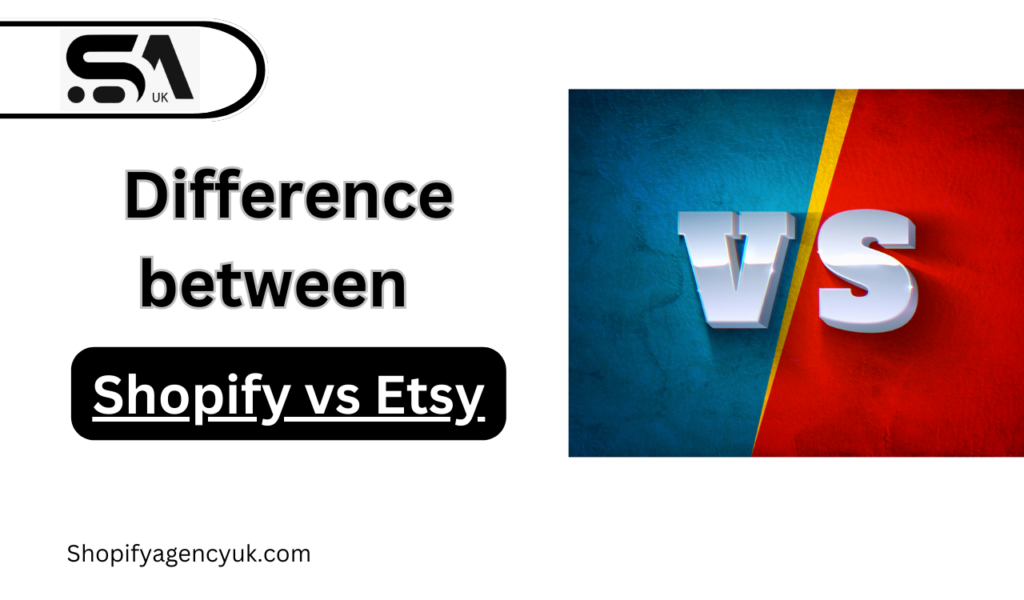Shopify vs Etsy: 10 Key Differences to Supercharge Your E-commerce Success (2023 Guide)
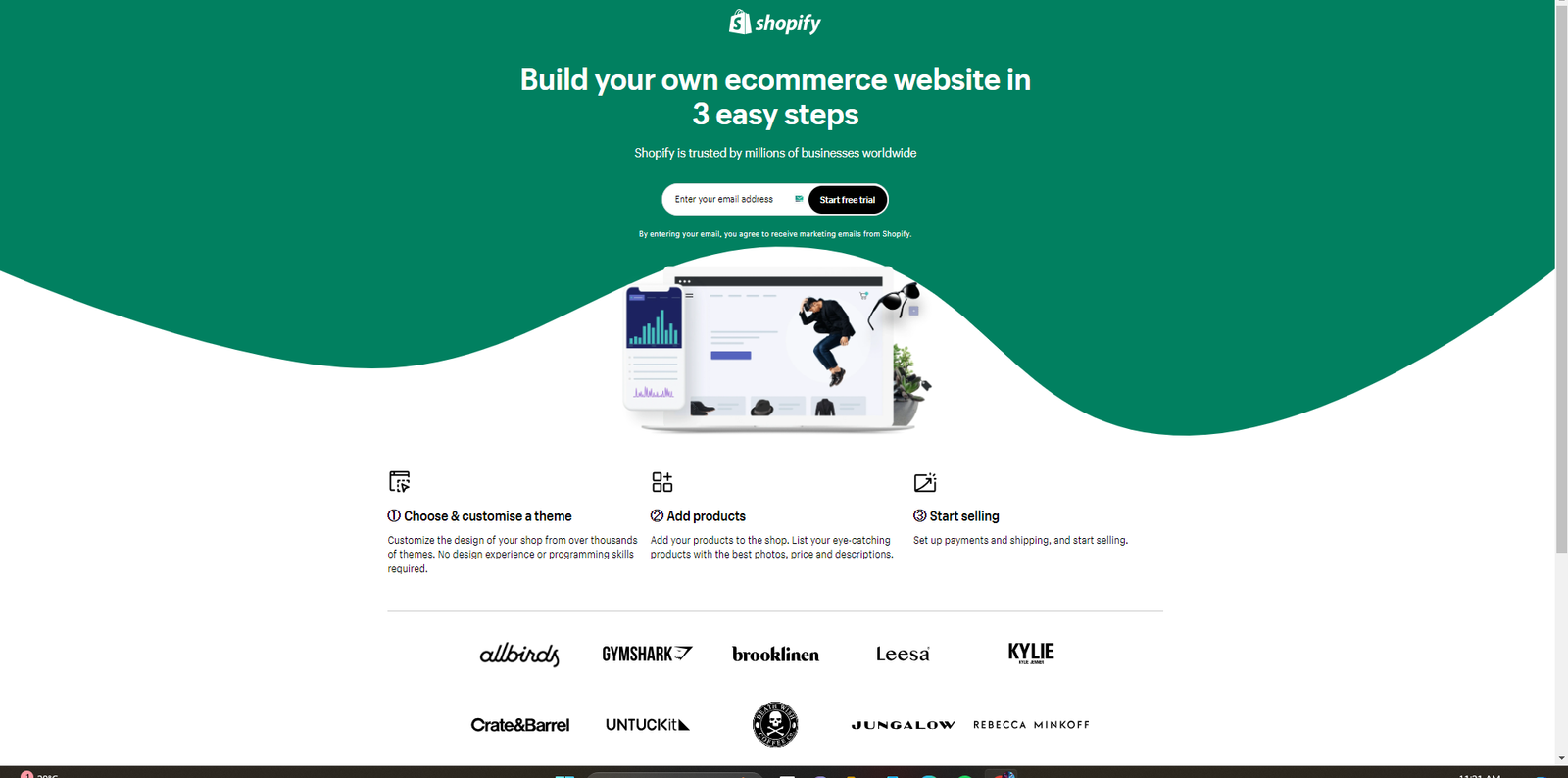
Which of these two platforms will render your e-commerce dream live? This is a situation that many e-commerce enthusiasts are in. The 2023 options for you are the line between your online business’s success and failure.
This exhaustive guide is a step-by-step explanation of the differences between Shopify and Etsy by which you can make a choice based on the analysis. We will touch upon:
- Platform types: Branded Spaces vs Marketplaces
- Customization options and design flexibility
- Product focus and diversity
- Target audience and customer base
Pricing structures and fees
Artisans and newcomers can benefit from knowing these platforms’ strengths and weaknesses. Hence, we suggest you carefully read the outline of your platforms’ capabilities and limitations and find out what best matches your business plan.
Shopify vs Etsy: 10 Key Differences for E-commerce Success
Understanding Shopify and Etsy
Are you set to explore the e-market world and start your web-selling idea?
Let’s look at two crowd-sourced, high-tech platforms, Shopify and Etsy that could be the best bet for success in your business.
These platforms helped many entrepreneurs achieve their dreams of becoming successful e-commerce businesses. But which one is right for you?
Overview of Shopify: Features and Target Audience
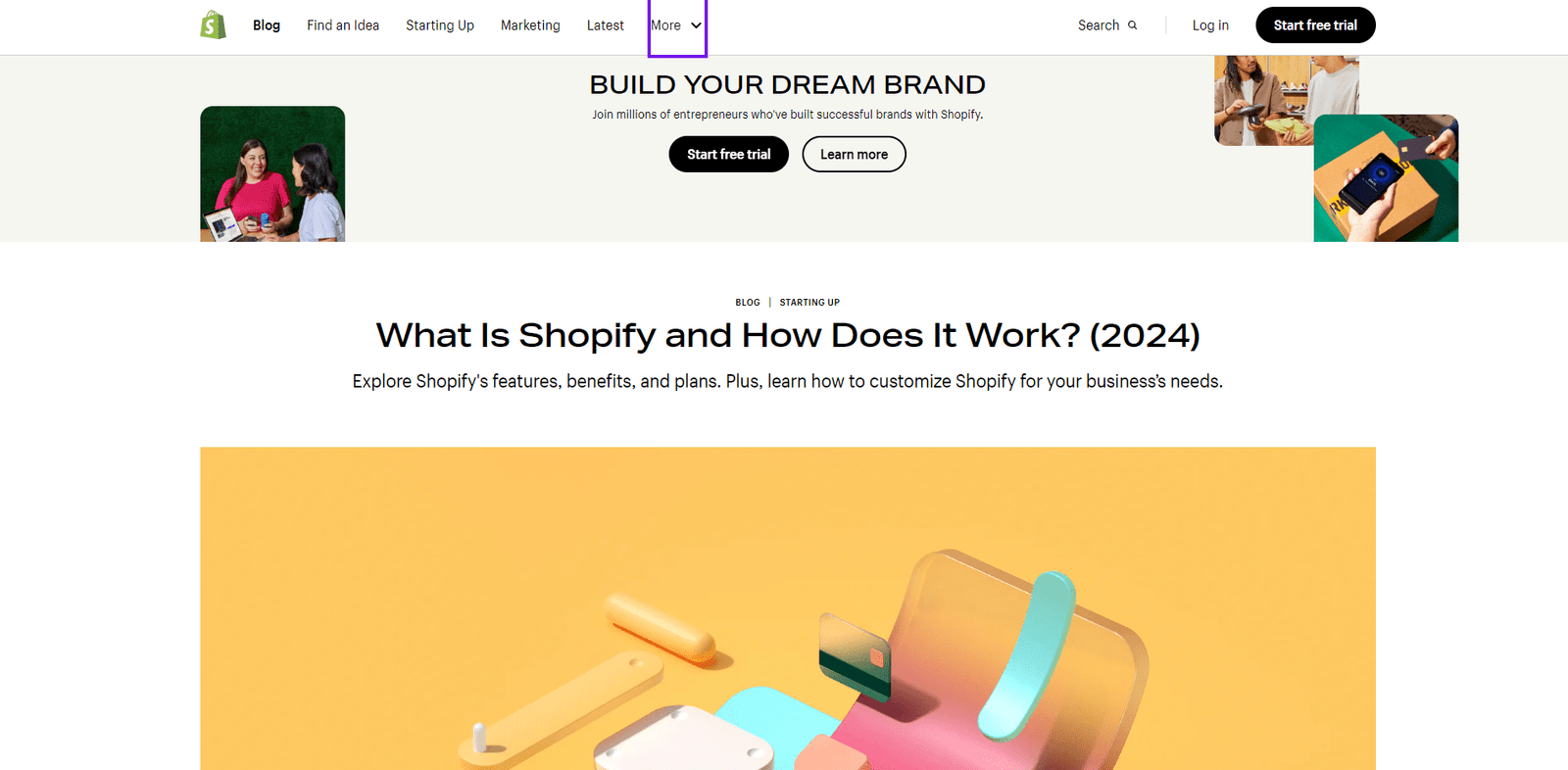
Wouldn’t having a shop on the digital main street that you can fully control, like a driver with a steering wheel, be great? That’s what Shopify is all about.
As a Shopify seller, you are responsible for the entire programmed operation of your online store. Shopify empowers you to take complete control of the site design, the product structure, and the inventory management.
Do you need more features? The Shopify app store is an excellent place to find marketing tools for your business.
Who’s it for? Anyone interested in making a website that is unique, from startups at the lowest level to large corporations.
Overview of Etsy: Features and Target Audience
- Now imagine a bazaar filled with various handmade and unique products. This is how Etsy could be described in brief.
- As an Etsy seller, you will join the community of artists and vintage fans and have a place for your handcrafted goods in the wide Etsy marketplace.
- Etsy serves as a turn-key storefront with its in-house traffic funnel, perfect for makers ready to dive into the meat of their craft.
Who’s it for? Artisans, crafters, and vintage sellers concentrate on selling products to a specific group of people who prefer handmade and unique items.
💡 Key Takeaways: The principal difference between the two platforms is that Shopify is a stand-alone customizable store, while Etsy is a ready-made marketplace for handmade and vintage goods.
Platform Types: Branded Spaces vs Marketplace
Using Shopify, you become a sophomore merchant. It is like buying and developing real online property.
You can construct a self-sustained site-specifically attached to your brand with Shopify. You decide what your store should look like, including all design, operation, and features.
However, Etsy is more like setting up a booth at a fair because there is already a flow of people you can expect. You are engaged in a shopping spree with many other retailers and consumers in the Etsy market, where you have only a tiny corner of it.
Let me give you a quick comparison:
Shopify: Your unique domain, total control over the brand identity, and a wide range of products to sell.
Etsy: This is Etsy, a place where you are, an established and well-known marketplace with a focus on handmade and vintage products.
Which of them is your dream setup?
💡 Key Takeaways: Shopify allows the presence of a unique store, while Etsy provides an instant entrance into the already existing marketplace.
Customization and Design Options
- Who doesn’t wish to have a store that represents the company in every respect? We will examine two such e-commerce platforms, Shopify and Ety, to see how their design capabilities compare.
- You can treat Shopify as a blank canvas full of possibilities for experimenting with your ideas. Do you want a natural, sophisticated look or a quirky, colur style? You can choose them on Shopify.
- Contrary to Shopify, which is essentially a blank page, Etsy is like an already-prepared template. The possibilities for customization are fewer, and you can only do them within Etsy’s customary scheme.
Shopify’s Customization Capabilities
- Imagine you are a Shopify developer (or you have hired one). The world is at your service!
- You can create a unique website that will immediately grab people’s attention. Everything, from the page design to the colour selection, can be appropriately shaped and branded.
- For instance, a shop specializing in vintage dresses might design a vintage-look-alike site using outdated fonts and a sepia-coloured palette.
Etsy’s Design Limitations
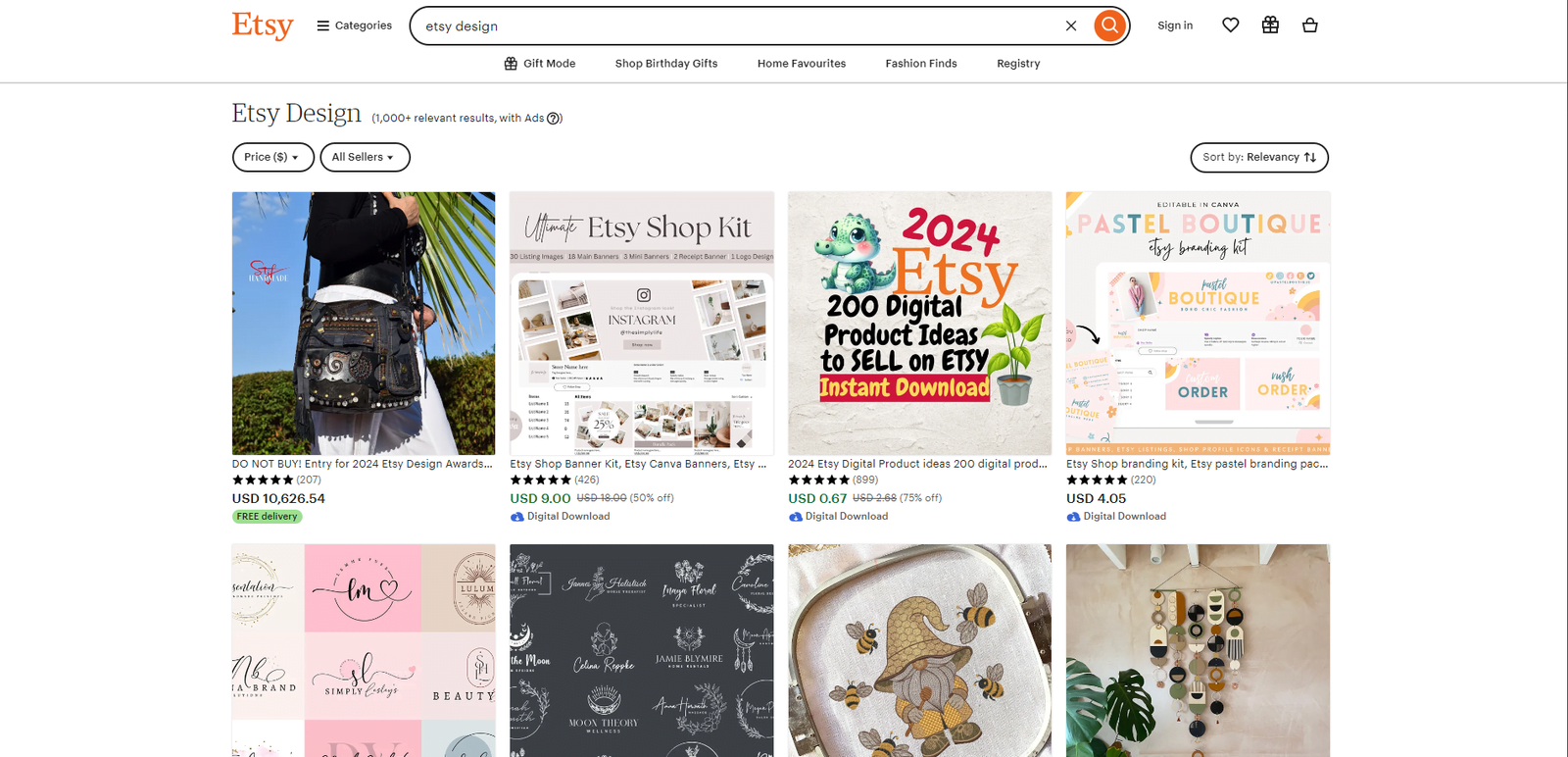
- Picture now your Etsy shop. It’s easy to use and customer-friendly but looks like other Etsy shops.
- While you can customize your product pages with good photographs and descriptions, the general view of your store is in line with what Etsy wants.
- It is much like the decoration of a dormitory. Even if you can add some original details, the whole construction process will remain the same.
💡 Key Takeaways: Shopify’s customization is high, while Etsy’s design style within the brand is a bit constrained. Another critical difference is that Shopify allows many customization possibilities, while Etsy has no more growth options outside its marketplace.
Read more: Top 10 Clothing Stores on Shopify
Product Focus and Diversity

At present, when it is not easy to meet health requirements and lockdowns, everyone who is not already a network user is forced to learn to shop online. They will not abandon the shoppers, and by transforming the stores into the e-commerce model, the rules will change, and business people and future entrepreneurs will have to change their approach as the market situation will be different.
If we take Shopify as the favourite department store for all items, the Etsy brand should resemble the unique boutique that sells handmade artisan products, vintage art pieces, and fun stuff to make.
Shopify’s Versatility
Shopify is a comprehensive e-commerce platform. You cannot limit which product you sell since Shopify is a full-functionality e-commerce website creator for any product.
You may wonder if your organic jam will be your only product in stock. You can supplement it with healthy munchies like vegan buttercream or graphic T-shirts. You can also create a great selection of digital and physical products you can sell that one day; it will be printed ads or perhaps pet supplies.
As a real example, a Shopify store can offer it like this:
- Handcrafted jewellery
- Dropshipped electronics
- Digital photography courses
- Personalized pet accessories
- The decisions are all yours!
Etsy’s Niche Market
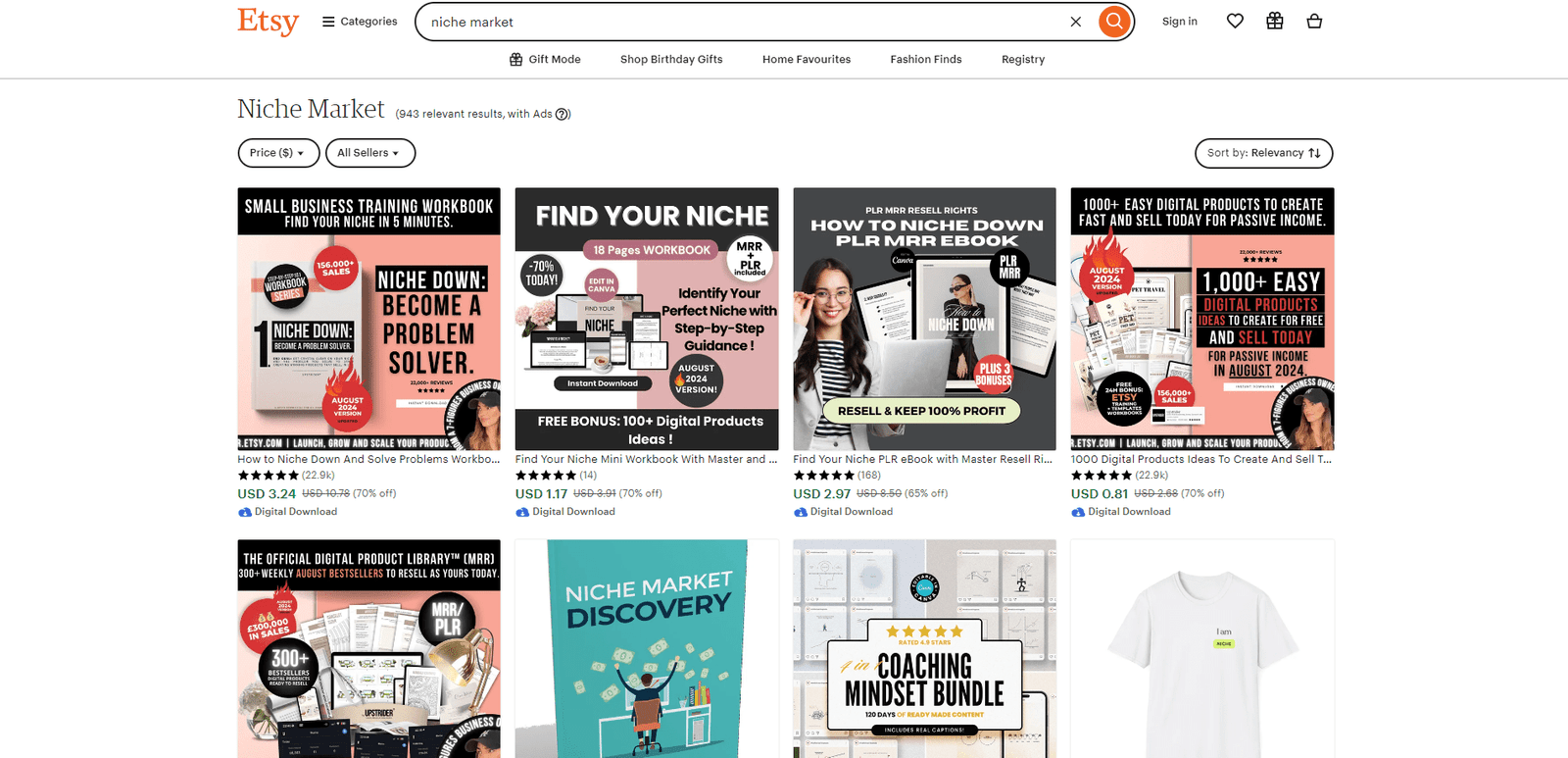
- When it comes to specific area items, Etsy knocks the competition out. It is the place for:
- Precious handmade products (e.g., knitted scarves, ceramic mugs)
- Vintage clothing (with classic 50s dresses or the cat-eyes shape of sunglasses)
- Crafting tools (from crochet hooks to sewing machines)
If you’re into the mass production of items or want to provide services, you may not get the best from Etsy. Besides, do you sell only one-of-a-kind, handcrafted items? The answer is positive: it is a perfect place to find luck and money.
💡 Key Takeaways: Shopify spans a range of production items in the e-commerce market, while Etsy is a specialist e-store where prices may seem a bit higher compared to Shopify products.
Target Audience and Customer Base
Who is your market? A critical question is this: You must choose between Shopify and Etsy.
Shopify represents the idea that remote work can be worldwide. Whether it is broad or niche will depend on what you do with a Shopify store’s options.
On the flip side, if you choose Etsy, it will be easier because Etsy already has a built-in ready-made audience. These shoppers hunt for irregular items and products that are no longer available. You may sort out the materials; you’re after the system, the grammar check, and the rest, but the people’s interest still comes first.
For instance:
- A Shopify store with eco-friendly cleaning products could target environmentally responsible house owners of all ages.
- An Etsy shop designed to provide hand-knitted baby clothes to new parents looking for that special, exclusive thing.
- While with Shopify, you have to do much of the direct work to get your buyers onboard, you have the freedom to target any market for which a bit more money and hard work will pay off.
- On the contrary, as an Etsy seller, you will find that most of the customers are epithets in their descriptions, such as this one: artsy types who prize handmade goods from small crafters in the women’s sector and artistic photographers with a special touch in their photos.
- 💡 Key Takeaways: Shopify allows for custom marketing communication and targeting of customer groups, which is absent with Etsy, which only offers the platform’s typical customer profile.
Brand Identity and Control
- Your brand is the outward manifestation of your company’s personality. It is your signature, the thing that separates you from your competitors, and your brand is the heart of your business. Then Shopify and Etsy, how come?
- With Shopify, you are your domain master. Being a shop owner gives you the right to a store 100% equipped with your brand. Everything, from your logo to your colour scheme, will show your brand identity.
- Etsy allows some decoration, but the shop is part of Etsy. Your shop is part of the whole Etsy place.
Imagine the following situations:
- While Shopify sets the stage for a minimalist store selling new AI devices, complete with your domain and branded packaging, selling on an Etsy marketplace is restricted to the environment in which this company has developed.
- On Shopify, you might design a minimalistic store featuring your electronics products using your domain name and the branded packaging you have. On Etsy, you can always customize the shop banner and the product images; however, it will still be an Etsy store.
- 💡 Key Takeaways: Shopify allows complete control over brand and customer data, which is not the case with Etsy, which offers little branding but necessary full specifications and retains much of the buyer data.
Market Access and Customer Acquisition
- The e-commerce store must be visible to those who want to buy the product. The marketers in charge of Shopify and Etsy have entirely different approaches in this matter.
- Shopify can be seen as a mall that has yet to be operational. Many stores have problems to face, but the managers can develop their shops and work hard to attract customers by using methods like advertisements, holding deals, competitions, outbidding other stores, etc.
- On the other hand, Etsy is like a busy mall with a store inside, which you wish to include in the list of existing stores. You are part of the bigger Etsy market, and at the same time, other sellers can look up your transactions.
Shopify’s Approach:
- You’ll need to invest in marketing and advertising to get customers.
- Shopify includes SEO, social media, and email campaign tools in its marketing suite.
- Shopify Collabs will get you in touch with influencers and affiliates.
Etsy’s Approach:
- You get quick access to millions of Etsy shoppers.
- Listing products on Etsy’s search engine can be used to create a course for customers to find your products.
- The Etsy logo itself already denotes trust with potential clients.
- 💡 Key Takeaways: Shopify acquires customers through marketing and sales, while Etsy gives direct access to a marketplace of potential customers.
Platform Flexibility and Scalability
Shopify’s Scalability:
- Be a baby business now and grow using the tool without changing to other platforms.
- Get new items or even a whole new line quickly through e-commerce.
- Upgrade your package as your business reaches a new level.
- Combine with a wide range of appliances and means of service for your growth.
Etsy’s Limitations:
- Ideal for small and medium-sized companies
- In case of increased business, it may feel too small and confined.
- Expanding outside the Etsy site is a nonexistent option.
- Shopify vendor will exceed the storefront maintenance of technical issues and allow the startup to focus solely on elevating the business.
Key points: Shopify’s platform allows sellers to attain higher goods for more sales and broaden product selection. However, the Etsy marketplace may be the only option since it’s where your products are seen and sold.
Etsy’a Niche Market
- Etsy excels when it comes to particular categories. The point of this platform is to specialize only in:
- Handmade products (such as scarfs knit or coffee mugs moulded)
- Apparel from the past (like 1950s dresses or clear eyeglasses)
- Handicraft tools (which could be anything from hooks to sewing machines)
There are better places to start if you are marketing mass-produced products. However, if you are selling items made by hand, you may find this a jackpot!
💡 Key Takeaways: Shopify provides more choices and will fare better in scaling up in the future, while Etsy is preferred by most companies, especially those that have yet to spread their wings.
Pricing Structures and Fees
- Moneywise, we all agree that the issue is a win, and the least we should discuss is Shopify and Etsy.
- Both platforms have their pricing schemes; you must assess your budget and business plan to determine how you will accommodate them.
Shopify’s Pricing Plans
- There are three popular Shopify pricing plans. Different plans target different sizes of businesses. Here is a quick run-through of the three:
- Basic Shopify: $29/month
– Ideal for new online entrepreneurs with plenty of functionality
- Shopify: $79/month
– Used by firms who are outpacing their current plans
- Advanced Shopify: $299/month
